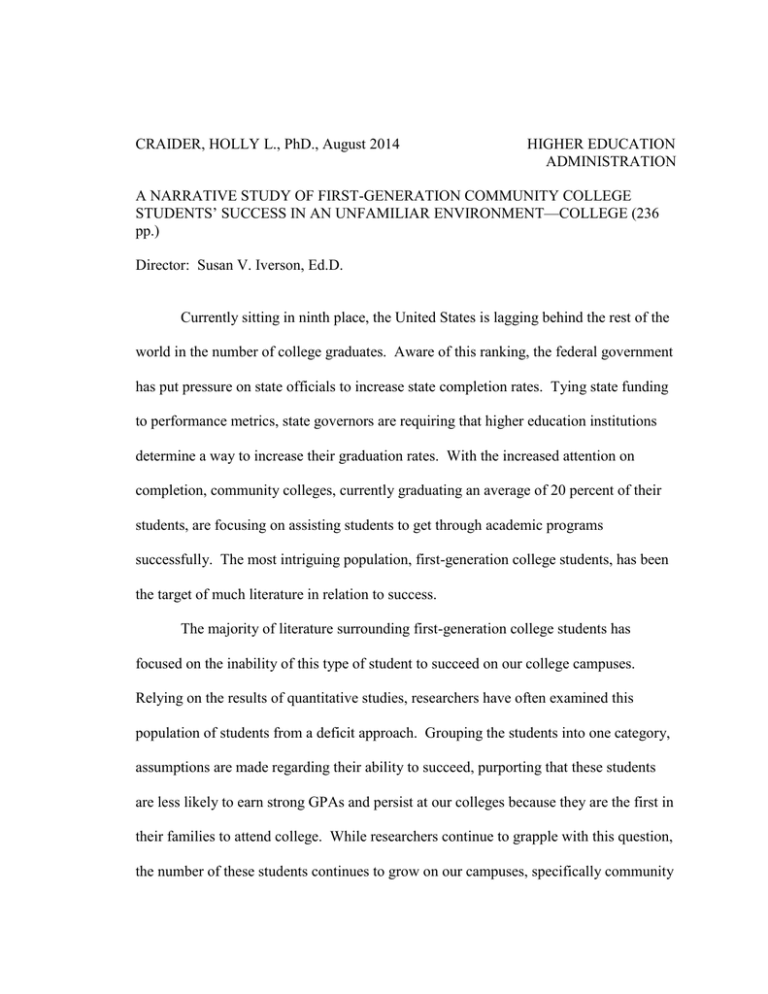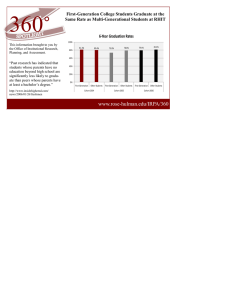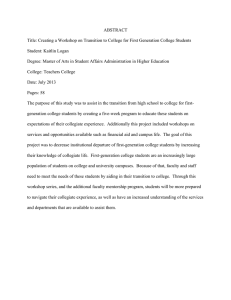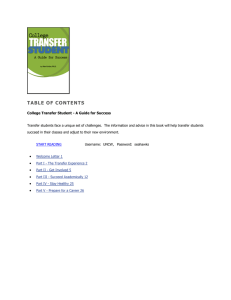CRAIDER, HOLLY L., PhD., August 2014 ... ADMINISTRATION A NARRATIVE STUDY OF FIRST-GENERATION COMMUNITY COLLEGE
advertisement

CRAIDER, HOLLY L., PhD., August 2014 HIGHER EDUCATION ADMINISTRATION A NARRATIVE STUDY OF FIRST-GENERATION COMMUNITY COLLEGE STUDENTS’ SUCCESS IN AN UNFAMILIAR ENVIRONMENT—COLLEGE (236 pp.) Director: Susan V. Iverson, Ed.D. Currently sitting in ninth place, the United States is lagging behind the rest of the world in the number of college graduates. Aware of this ranking, the federal government has put pressure on state officials to increase state completion rates. Tying state funding to performance metrics, state governors are requiring that higher education institutions determine a way to increase their graduation rates. With the increased attention on completion, community colleges, currently graduating an average of 20 percent of their students, are focusing on assisting students to get through academic programs successfully. The most intriguing population, first-generation college students, has been the target of much literature in relation to success. The majority of literature surrounding first-generation college students has focused on the inability of this type of student to succeed on our college campuses. Relying on the results of quantitative studies, researchers have often examined this population of students from a deficit approach. Grouping the students into one category, assumptions are made regarding their ability to succeed, purporting that these students are less likely to earn strong GPAs and persist at our colleges because they are the first in their families to attend college. While researchers continue to grapple with this question, the number of these students continues to grow on our campuses, specifically community college campuses. Due to increased numbers of first-generation students attending community colleges, researchers have directed more attention toward this population of students and more information is needed. The purpose of this research was to explore first-generation community college students’ ability to succeed in an unfamiliar environment—college. Acknowledging the fact that they are able to succeed, I questioned the deficit theory approach previously embraced by researchers regarding this population. Utilizing narrative inquiry methodology, data was collected through in-depth interviews with a diverse sample of six students at a large community college in the Midwest. Using a three-dimensional framework, participants were asked to explore their pasts, presents, and futures in regard to their ability to succeed. The content of the narratives was analyzed using Fraser’s (2004) line-by-line approach. A constructivist framework guided the interpretation of the results. The results of this study indicate that the tendency to understand first-generation community college students from a deficit approach should not be encouraged. Contrary to what the social constructions have indicated, these students are capable of the same academic endeavors as their continuing-generation peers. Regardless of early environments, they are able to succeed at our community colleges. Once we truly understand where they have been, who they have become, and where they wish to go, we can build on their strengths to ensure that they will succeed at our institutions.




